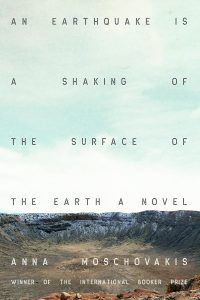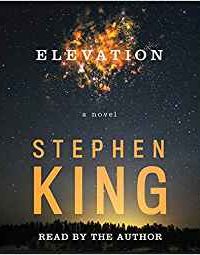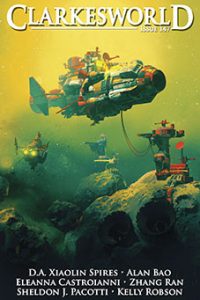An Earthquake Is a Shaking of the Surface of the Earth by Anna Moschovakis: Review by Jake Casella Brookins
 An Earthquake Is a Shaking of the Surface of the Earth, Anna Moschovakis (Soft Skull 978-1-59376-783-9, 208pp, $16.95, tp) November 2024. Cover by Gregg Kulick.
An Earthquake Is a Shaking of the Surface of the Earth, Anna Moschovakis (Soft Skull 978-1-59376-783-9, 208pp, $16.95, tp) November 2024. Cover by Gregg Kulick.
I’m continually interested in how the coronavirus pandemic does – or commonly doesn’t – make its way into fiction. It’s such a huge event, but one that “realistic” novels, movies, and television series seem hesitant to engage with, opting instead for a kind of hazy present that is just before or just long enough after. (Granted, it’s not been very long in publishing and production time.) Science fiction has a better track record of grappling with world-altering events on the regular, but by the same token, perhaps, it has a trickier time conveying the mundanities of the moment; I think it’s worth applauding artists who are finding ways to think through the oddities and tragedies of the last few years.
Not to say that poet and translator Anna Moschovakis’s An Earthquake Is a Shaking of the Surface of the Earth is anything so simple as a COVID novel, but that is a reading that continually occurred to me. Here, it’s not a virus that has disrupted society, but a seemingly endless series of seismic tremors and aftershocks: “motion, rather than stillness, has become the rule.” The nameless narrator, a former actor on furlough in this seemingly perpetual disaster, is mentally spinning in a way that I think a lot of us will recognize from the lockdown days – energy and anxiety lacking the usual channels, tossed between wave and trough of information and conspiracy. The narrator seems to be on a personal quest for clarity – finding something fixed in the tumbling landscape – and, more disturbingly, is increasingly fixated on murdering her younger roommate, Tala, for reasons unclear.
It doesn’t quite do this novel justice to call it “weird,” though it is that. Partially stream-of-consciousness, partially collaged out of journals and voice memos, it’s a terribly intelligent novel, emphasis on the terrible: a diary of self-discovery becoming something darker, as introspection in an interrupted world reaches for meaning and finds only theories, only conspiracies. (There are several points where the novel seems to invite you to ask: Is everyone else better at walking through the tremors than the narrator? Or is she the only one feeling them?) There are sections here that had me thinking of Philip K. Dick’s A Scanner Darkly – a kind of paranoid but revelatory atmosphere – and others that, in their shocking humor and clear unreliability, recall some of Chuck Palahniuk’s work.
One thing that sets this novel apart is Moschovakis’s deep interest in language as a shaper of mentality and reality: The narrator seems to have a troubled relationship with therapy and self-help narratives, but is consciously trying to rid herself of “junk phrases,” to eliminate or at least refuse to think unmarked the metaphors and idioms that color normal speech. The ironic emphasis Moschovakis uses to convey this is very well done, italics and other devices injecting a kind of deprecating stress in the narrator’s internal monologue that constantly make “regular” phrases seem alien, even sinister. It’s a fine bit of defamiliarization, along with the frequently poetic and disruptive text itself, and one that buttresses the novel’s interrogation of selfhood and authenticity – the narrator’s commitment to the craft of acting has previously exposed her to some of the more toxic formulations of method acting. In a world where disaster has suspended all the usual norms, all the usual rules, it’s hard to see what role she has or is crafting.
Because all the while, the earth is shaking. The narrator falls as she bends to tie her shoes, or as she attempts to cross the street. “The fractured concrete rose and fell in waves, undulating like the cracked leather skin of some great alien ready to give birth. I am a parasite on that alien, I thought, a freeloader.” What is happening, and why, remains both all-important and nebulous; conspiracies include something “fracking-related, multinational-conglomerate-related” but we never get a clear theory. City life takes on new and surreal forms: the narrator glimpses inscrutable office rituals, receives odd cards and brochures like government-sponsored self-help Tarot, makes passing connections with other wanderers, and wonders where Tala has got to.
“It was longing that felt like lust, but wasn’t, that felt like envy but wasn’t.” The central mystery of the novel remains why the narrator wants to kill Tala, and Tala’s absence throughout its present prevents us, and the narrator, from solving it. An Earthquake Is a Shaking of the Surface of the Earth is about ruptures, about the vacuum formed when roles and routines evaporate; it’s also about the strange seductiveness of metaphors, of characters, of story, how once you agree to their first terms you find yourself trapped in that framework. Unsettling and insightful, the novel is an homage to finding a new sense of balance – or to crawling if the shaking is too intense.
Interested in this title? Your purchase through the links below brings us a small amount of affiliate income and helps us keep doing all the reviews you love to read!
Jake Casella Brookins is from the Pennsylvania Appalachians, and spent a fantastic amount of time in the woods. He studied biology, before switching over to philosophy & literature, at Mansfield University. He’s been a specialty coffee professional since 2006. He’s worn a lot of coffee hats. He worked in Upstate New York and Ontario for about 8 years. He’s been in Chicago since 2013; prior to the pandemic, he worked for Intelligentsia Coffee in the Loop. Starting in 2021, he’s been selling books at a local indie bookstore. He lives with his wife, Alison, and their dogs Tiptree & Jo, in Logan Square.
This review and more like it in the November 2024 issue of Locus.
 While you are here, please take a moment to support Locus with a one-time or recurring donation. We rely on reader donations to keep the magazine and site going, and would like to keep the site paywall free, but WE NEED YOUR FINANCIAL SUPPORT to continue quality coverage of the science fiction and fantasy field.
While you are here, please take a moment to support Locus with a one-time or recurring donation. We rely on reader donations to keep the magazine and site going, and would like to keep the site paywall free, but WE NEED YOUR FINANCIAL SUPPORT to continue quality coverage of the science fiction and fantasy field.
©Locus Magazine. Copyrighted material may not be republished without permission of LSFF.









